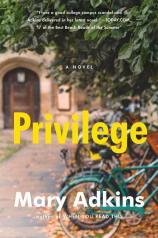Privilege
Review
Privilege
Following the success of her debut, WHEN YOU READ THIS, Mary Adkins returns with a sharp, smartly written novel about the intersections of class, gender and race set on the idyllic campus of Carter University, "The Harvard of the South.”
PRIIVLEGE is told from the points of view of Annie, a smart young woman with body image issues; Bea, a brilliant and resolute biracial girl; and Stayja, a townie who works at Carter to support both her ailing mother and her dream of becoming a nurse. Coming from wildly different backgrounds and viewpoints, they provide a thoroughly fleshed out and at times painful portrait of life on a prestigious college campus that claims to be liberal, but in fact holds up many troubling double standards, particularly when it comes to gender and socioeconomic class.
Annie Stoddard was tragically disfigured by a grill that fell onto her when she was younger, leaving her with dark, criss-crossed scars that cover her legs. For years, she has hidden herself away in jeans and sweatpants, even during Georgia’s hottest summers, but Carter offers her a chance to forget all of that. An accomplished bassoonist, Annie has earned a full scholarship there, but in addition to that, she has found work as a bassoon tutor, earning upwards of $50 an hour to train her professor’s son. Her earnings have enabled her to pay for plastic surgery to erase her intense scarring, and now, at the start of her second year at Carter, she is ready to wear shorts and miniskirts and feel like a real girl for once. Even better, an attractive, shaggy-haired frat boy named Tyler Brand has noticed the change in her confidence.
"PRIVILEGE is a thought-provoking and timely novel about the ways in which each of us hold and fight against both our own privileges and those of others."
As a biracial young woman, Bea Powers has her misgivings about attending college in the South. Accepted to Princeton, Yale and scores of other liberal arts schools with impressive track records, she has been drawn to Carter for its Justice Scholars program. She read a book by the lead professor during high school and ever since has been fascinated by the ins and outs of justice, and how difficult it is to define in a world rife with racism, classism and sexism. Though eager to follow in her favorite professor’s footsteps, Bea is doing it mostly alone: her father was never part of the picture, and her mother passed away a few years ago. She lives with her best friend and the girl’s loved ones, who are her legal guardians, but being a white family with a private plane, there are certain things about the justice system she knows they simply won’t understand.
And then, just behind the counter of the Coffee Bean, we have Stayja York. Stayja is smart --- both bookish and street savvy --- but the world seems destined to crush her. She and her mother live in a home owned by relatives, but even then, they cannot seem to make ends meet. Stayja makes too little at her job to qualify for benefits, and confusingly her mother makes more money on disability than she could at any job she could actually get and maintain. Straddling the lines of poverty and financial stability, they struggle to stay afloat while Stayja attends college. Luckily for Stayja, she has two best friends and, recently, the attention of a long-haired frat brother who attends Carter.
Annie, Bea and Stayja’s lives intersect when Annie wakes up one evening to find Tyler sexually assaulting her. Eager, like so many women, to write the incident off as a drunken accident, Annie strikes up a pleasant but anxiety-filled relationship with Tyler. And then, on a night when there is no alcohol involved, he rapes her again. She quickly files charges with the school, and the Carter campus opens up to waves of misogynistic comments, fiery arguments about feminism and consent, and a gender war that no one can possibly win.
With Tyler’s “trial” approaching, Bea is appointed as his student advocate, someone who can help him navigate the justice system, collect witness statements and lend a supportive ear. Bea, who is familiar with Tyler through her work with the school’s improv team, is shocked to find that he is not only remorseful, but ashamed. Though she has always believed in siding with the victim --- especially if she is a woman --- she finds herself worried for Tyler. Stayja, too, is caught up in his boyish charm and shaggy head of hair. When he tells her that Annie is lying, she believes him, even when the argument hits a little too close to home.
Though PRIVILEGE is, at its core, the story of a rape trial gone terribly wrong, Adkins covers so many other types of privilege and their trappings in this smart, poignant book. Even as Tyler is revealed to be a rapist, he is desperate to help Stayja apply for student loans and rethink the ways that the government can and has helped her. Similarly, Bea balks at the racism displayed by her classmates, but fails to see the other types of predators around her. This is a novel full of “gray areas,” and though I would argue that the rape is not one of them, Adkins is thorough and careful in her rendering of the reactions on campus --- from derogatory comments from students to poorly thought-out op-eds by professors and, finally, the school’s ruling on Tyler’s behavior. Weaving a story all too common to readers familiar with the #MeToo movement with thought-provoking commentaries on race and class, Adkins forces readers to consider not only their own privileges, but how they have perpetuated dangerous and toxic cycles of racism, sexism and classism themselves.
This is an ambitious book, and though Adkins has a strong handle on each of her themes, her prose failed to dig as deep as I would have liked. Bea in particular felt ignored at times, and it would have been nice to see far more of her experience as one of the few POC students at Carter and in the Justice program. Her actions vacillated between hopelessly naive, needlessly reckless and downright absurd, and I wanted her to be more fully developed, especially as her role in the story was one of the most interesting, as a woman defending a rapist. Adkins accomplished so much with Annie and especially Stayja that Bea’s chapters felt rushed and devoid of the same intellectual prodding that she has proven herself adept at.
All in all, PRIVILEGE is a thought-provoking and timely novel about the ways in which each of us hold and fight against both our own privileges and those of others. Though sexual assault is the book’s main theme, I was impressed by Adkins’ bravery and willingness to confront other types of privilege. I just wish she had pushed even further when it came to race.
Reviewed by Rebecca Munro on April 10, 2020
Privilege
- Publication Date: March 9, 2021
- Genres: Fiction, Women's Fiction
- Paperback: 368 pages
- Publisher: Harper Paperbacks
- ISBN-10: 0062887106
- ISBN-13: 9780062887108




